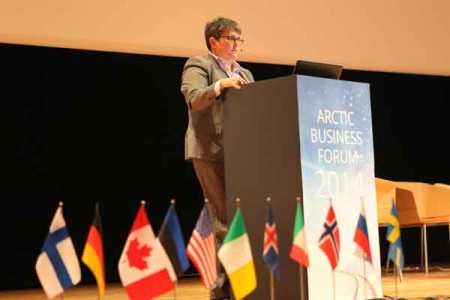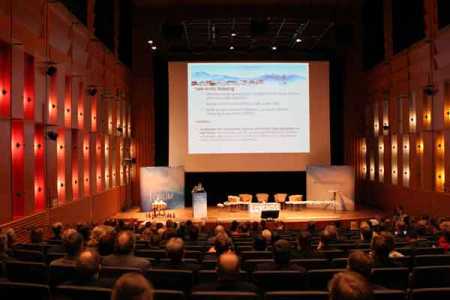Thu, 13 Mar, 2014 04:29:52 AM Arctic Business Forum finds recession, political crisis key obstacles to investment FTimes Report by Shahidul Islam, March 13
Speakers at the forum also termed the double-dip global recession and the Crimea crisis the key obstacles to investment in the Arctic region. About 200 business leaders, government officials, diplomats, academicians, and other professionals from 10 countries are taking part in the 3-day annual event hosted by the Lapland Chamber of Commerce at Korundi House in Rovaniemi. The forum started to roll with pre-conference activities on Tuesday. The first working day of the forum began on Wednesday with the inaugural speech of Aimo Takala, Chairman of the Board, Lapland Chamber of Commerce. He said the aims of the forum were to share information about the latest developments affecting business in the Arctic and to discuss actions to overcome the known and foreseen barriers to business and trade. The Canadian Ambassador to Finland, Andrée N Cooligan also addressed the session. She said Canada, which owns 25-30% of the Arctic, is working with other Arctic countries for a Responsible Arctic Resource Development. Lapland Chamber of Commerce President and CEO Timo Rautajoki in his speech focused on the financial crisis as the reason behind delay in Arctic investment projects. He said energy-sector projects were re-evaluated due to shale gas and shale oil developments, while the recent political crisis in Europe might create obstacles to project implementation. The chamber president named the Belkomur in Arkhangelsk Region, Murmansk Transport Hub in Murmansk Region, Rönnbäcken mine in Västerbotten, Norrbotniabanan railway in Norrbotten, Talvivaara mine in Kainuu Region, Fennovoima Oy Nuclear Power Plant in Oulu Region, and Sokli Mine in Lapland as the key investment projects in the Arctic.
Tim Boersma, Fellow, Energy Security Initiative, The Brookings Institute, USA, and Hannele Pokka, Permanent Secretary, Ministry of the Environment of Finland, also spoke in the forum, among others. ABF Yearbook 2014 released The Arctic Business Forum Yearbook 2014 released on the occasion puts the investment potential of the European High North at 144 billion euro by 2020. However, the global financial crisis has slowed down the investment projects in the area that includes the northern regions of Finland, Sweden, and Norway and the Murmansk and Arkhangelsk regions of Russia. Some investment projects have been postponed and some entirely dumped. The energy sector in the area is facing new challenges and changes. The role of US shale oil and gas is still unclear in global business. Decreasing industrial production due to the global financial crisis has decreased the demand of energy. “These two factors have affected the giant Shtokmanovskoje gas field project in the Barents Sea. The project seems to have remained postponed for decades. The same situation seems to keep Norwegian investments back, too,” observed Rautajoki. Politics also has started to disrupt the business in the area. The crisis in Ukraine and Crimea has increased the tension between the Russian Federation and the EU and, most of all, the USA. Any sanctions against Russia, in case the problems are not solved, will directly reflect in the investment plans. “The investments projects and the investors expect predictability in business. Right now the future of investments looks fuzzy as the predictability has been shortened by both financial and political crises,” observed Rautajoki.
More News
|
|
Finland Times
| Monday, 29 April, 2024 |



